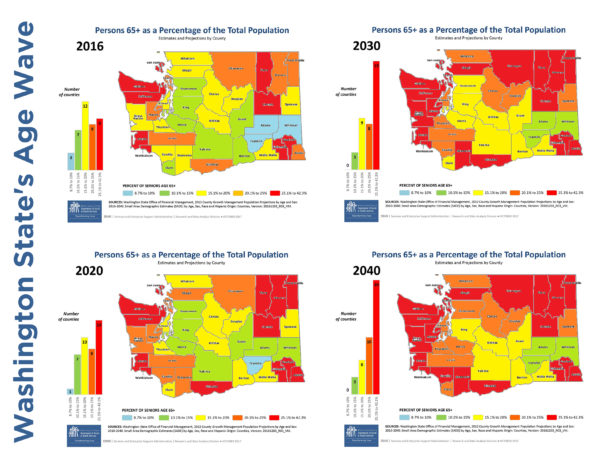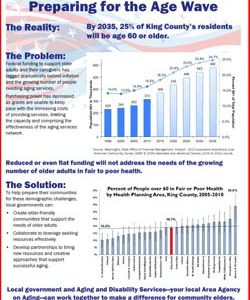Advisory Council
What We Do | Advocacy | Members | Committees | Meetings and Meeting Materials | Join Us
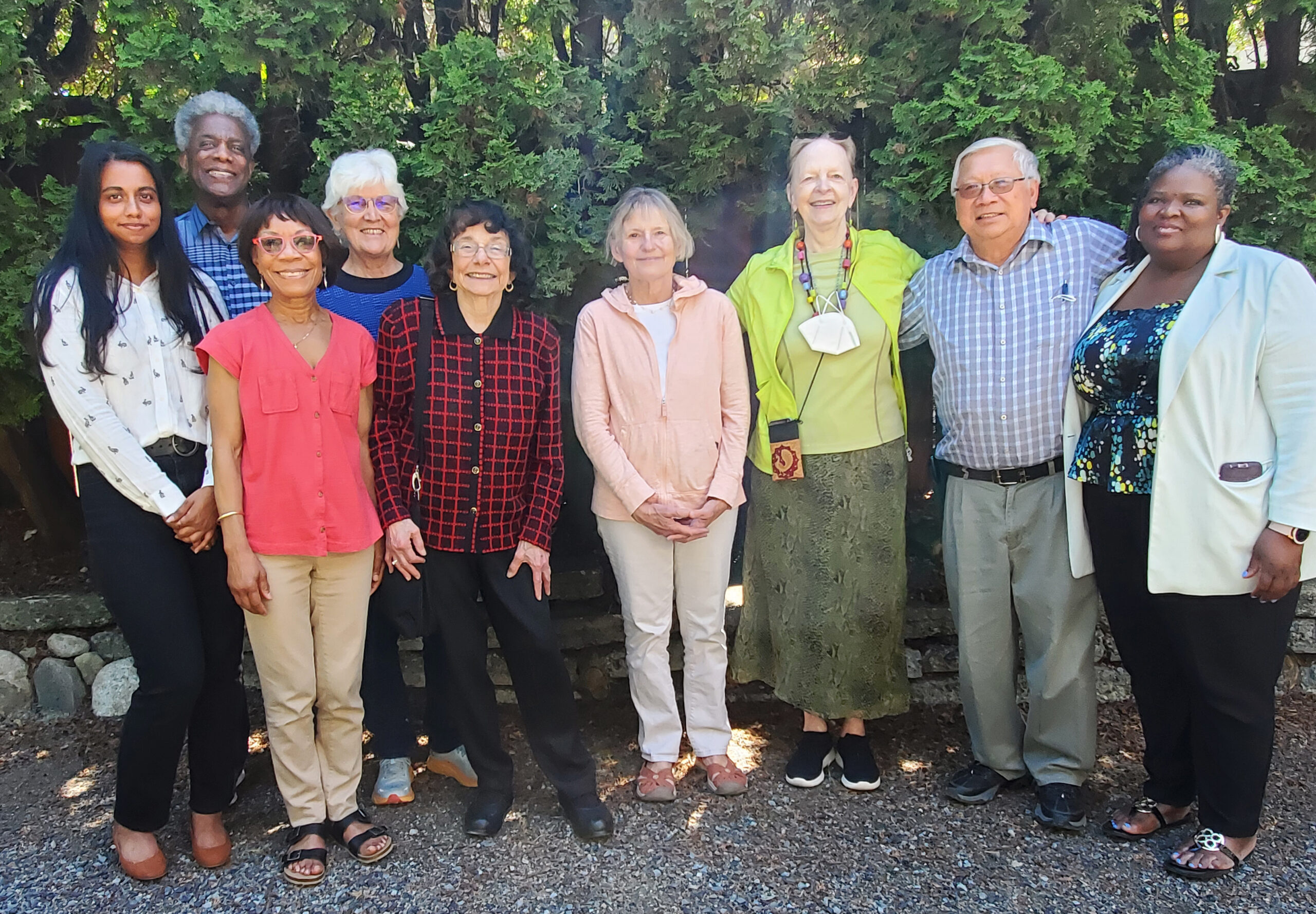 The Seattle-King County Advisory Council for Aging and Disability Services advocates for local, state, and national programs that promote quality of life for older people and adults with disabilities.
The Seattle-King County Advisory Council for Aging and Disability Services advocates for local, state, and national programs that promote quality of life for older people and adults with disabilities.
Brochure: Seattle-King County Advisory Council on Aging and Disability Services
Work of the Council: Advisory Council Bylaws
Click on the headings below for more information.
What We DoWhat Do Advisory Council Members Do?
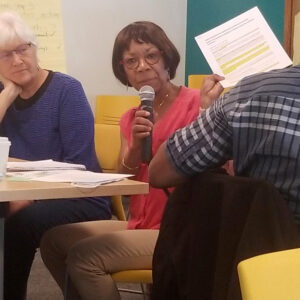 Advise: We bring our knowledge of local issues to Aging and Disability Services.
Advise: We bring our knowledge of local issues to Aging and Disability Services.
Advocate: We advocate at the federal, state, county, and city levels.
Connect: We connect with other organizations that provide for the older adults and individuals with disabilities, as well as with the general public.
Collaborate: We collaborate with local and statewide advocacy organizations to achieve mutual goals, including senior centers, disability organizations, and human services providers.
Advocating for Age-Friendly Communities
The Seattle-King County Advisory Council for Aging and Disability Services takes part in the annual Washington State Senior Lobby Conference and discuss priorities with our legislative delegation during Senior Lobby Day in Olympia. The Advisory Council also hosts and co-sponsors forums on issues such as ageism, aging in place, Alzheimer’s, behavioral health, end-of-life planning, food access, health care reform, housing, LGBTQ elders, Medicare, rural aging, transportation, the “Village Model,” and Washington’s aging readiness. See Advocacy section for more information.
Key Link Between the Community and the Area Agency on Aging
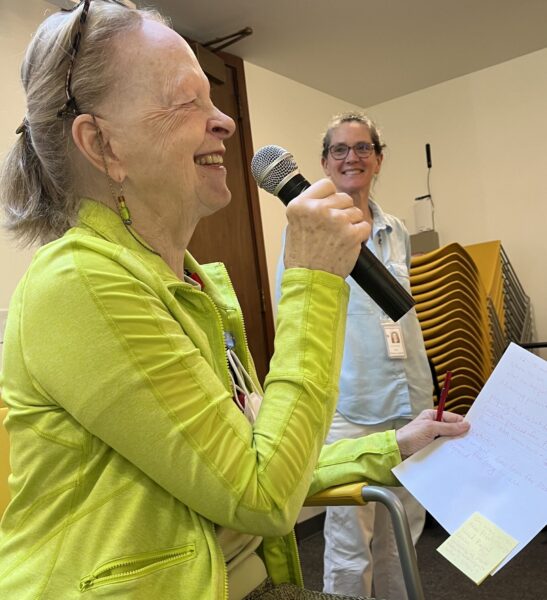 Aging and Disability Services—the Area Agency on Aging for King County—is funded by federal, state, and city sources to provide an extensive range of programs and services, including adult day services, caregiver support, case management, Community Living Connections, elder abuse prevention, health maintenance, health promotion, legal services, nutrition services, senior centers, and transportation. For services, contact Community Living Connections at 1-844-348-5464.
Aging and Disability Services—the Area Agency on Aging for King County—is funded by federal, state, and city sources to provide an extensive range of programs and services, including adult day services, caregiver support, case management, Community Living Connections, elder abuse prevention, health maintenance, health promotion, legal services, nutrition services, senior centers, and transportation. For services, contact Community Living Connections at 1-844-348-5464.
Area Agency on Aging (AAA) Advisory Councils are mandated by the Older Americans Act of 1965 as part of the Aging Network.
Age-Wise King County
The Seattle King-County Advisory Council publishes AgeWise, an e-zine on Aging and Disability Services, which is designated by the State of Washington as the Area Agency on Aging for Seattle and King County. Our free of charge, “front door” to professional, confidential services is Community Living Connections which we promote in each issue of AgeWise. Subscribe to our mailing list if you would like to receive a free copy of AgeWise King County via e-mail each month. All AgeWise articles are amplified in social media and are also posted in the News section of this site.
To submit an article for inclusion in an AgeWise newsletter:
- Review our AgeWise Copy Deadlines.
- Request pre-approval by e-mailing your topic to Irene Stewart well in advance of the deadline.
Legislative Priorities
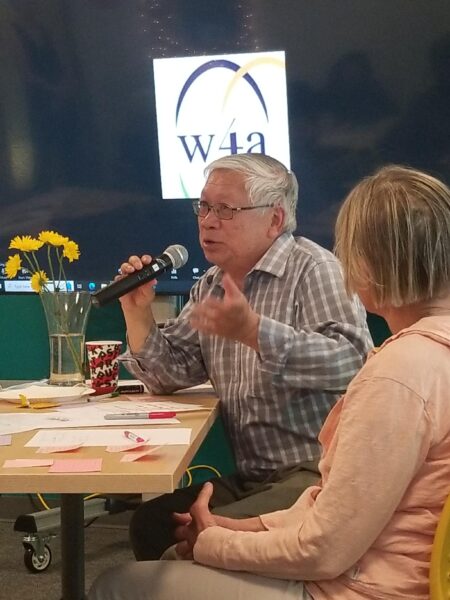 Aging and Disability Services (ADS) and its Advisory Council advocate on behalf of older adults, family caregivers and people with disabilities for local, state and national programs that promote quality of life for these populations.
Aging and Disability Services (ADS) and its Advisory Council advocate on behalf of older adults, family caregivers and people with disabilities for local, state and national programs that promote quality of life for these populations.
ADS Advisory Council members participate in other local and regional advocacy coalitions to ensure that our communities are aging friendly—great places for people of all ages to grow up and grow old.
By 2035, nearly 25 percent of King County’s residents will be age 60 or older. Local government and Aging and Disability Services—your local Area Agency on Aging—can work together to make a difference for community elders.
- 2024 W4A Legislative Priorities (December 21, 2023)
- 2023 State Legislative Priorities
- 2023 Aging Readiness Report AARP
- 2023 W4A Legislative Priorities
- 2023 USAging Policy Priorities
Advocacy Partners
Fall Senior Lobby Conference (Tacoma)
The Washington State Senior Citizens’ Lobby coordinates an annual conference in Tacoma each October that provides Advisory Council members and other Aging Network advocates an opportunity to learn about issues that deserve attention during the next legislative session. Pre-registration and payment is required. For more information, e-mail info@waseniorlobby.org.
Senior Lobby Day (Olympia)
The Washington State Senior Lobby schedules an annual statewide event that provides opportunity for Advisory Council members from each of Washington State’s Area Agencies on Aging and other advocates to meet with legislators. Read more about Senior Lobby Day in “A Day in the Life of a Senior Advocate” (AgeWise King County, March 2016).
Senior Lobby Meetings (Lacey)
The Washington State Senior Lobby holds monthly meetings on the third Monday of the month. For more information, email info@waseniorlobby.org.
Legislative Candidate Forums
In partnership with W4A, AARP, and other local advocacy organizations, the ADS Advisory Council convenes forums that focus on federal, state, and local issues important to older adults and people with disabilities.
Advocacy Links and Tips
- Information on population and demographics trends related to older adults and people with disabilities: Area Trends
- Directory of elected officials published by the League of Women Voters: Who Represents You
- Biographies and photos for Washington State Legislature elected officials: Pictorial Guide
- Washington State Legislative Information Center and Hotline: Information Center
- Tips for effective advocacy and navigating the system from the Washington Association of Counties: Engaging with Legislature
Ways to Get Involved
Make Connections
- Contact your Congressional representatives and to learn about bills, agendas, and committees: Congress.gov
- Contact your legislator and to learn about bills, agendas, and committees: Washington State Legislature
- Voice your opinion on the issues: Washington State Legislative Hotline
- Find and contact your elected County officials and to learn about local initiatives: King County Council and King County Executive
- Find and contact Seattle officials in Seattle or your municipals and learn about local initiatives: Seattle City Council and Seattle Office of the Mayor and Sound Cities Association
Attend our Advocacy Committee Meetings
The Advocacy Committee meets monthly, just before the full council’s regular meeting. Be sure to check the calendar to confirm time and location. For more information, e-mail aginginfo@seattle.gov.
Participate in Regional Coalitions and Advocacy Organizations
See a partial list or Advocacy organizations under Join Us.
Join the Mayor’s Council on African American Elders
The Mayor’s Council on African American Elders (MCAAE) is a 12-member council appointed to serve in an advisory capacity to the Mayor, City Council, and the Seattle Human Services Department in matters affecting older African Americans. Brochure
Our Council volunteers are appointed by the City of Seattle and King County and members serve (for up to three) two-year terms.
2024 Executive Committee
Chair: Alex O’Reilly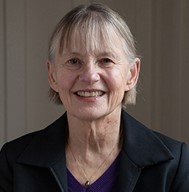
Alex started her professional career as a case manager for adults receiving public assistance on the south side of Chicago. She saw how the cycle of poverty was often passed down through generations and decided to get training in early childhood education to work more upstream with families and their young children to provide support that could change that trajectory. She worked in early learning environments in Chicago and later in Seattle when she moved here in 1985 and where she currently resides.
In 1988 Alex received her MSW from the University of Washington and worked as the program director for a child and family non-profit in Everett WA, and later as a planner for United Way of Snohomish County. Alex retired in 2021 as the Human Services Manager for the City of Bellevue after having worked there since 1997 initially as a human services planner. Alex’s work included funding human services for all people along the age continuum, but she was especially interested in older adult issues and worked closely with the Bellevue Network on Aging on many of their projects.
Alex’s special areas of interest include social support and other services that prevent more serious and costly problems later, legislative advocacy on local, state and federal levels, and transportation systems that provide access to all community members no matter what their mobility needs are. She currently volunteers with the Phinney Neighborhood Association’s Village Program, the Seattle Animal Shelter, and the Montlake Rowing Club where she rows as a master rower.
Vice Chair: Lorna Stone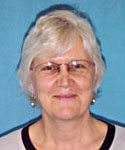
Lorna Stone received a Masters degree in social work from the University of Chicago. She has served as the Senior Officer for Grant Making and the Director of Rural Health at the Washington Health Foundation and volunteered as a trainer with the Rainbow Train, a cultural competency training program for health and social service workers on gay, lesbian, bisexual, and transgender elder issues. Her experience includes hospice social work, health promotion training, counseling, and work with chronically ill populations. The interactive relationships of institutional change, cross-cultural partnerships, and social justice remain an abiding interest.
Secretary: Barb Williams 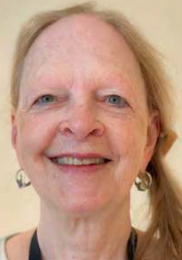
Barb has a long history of using her expertise to broaden educational opportunities to the underserved and hold leadership roles to be the voice of her community. She helped organize the annual Expanding Your Horizons conference for school-aged girls and young adults in Spokane for several years and served as the chair for three years. After moving to Seattle, she became active in environmental education as a board member and program director for the Environmental Science Center in Burien. Since then, she has committed her time and passion to the environmental education realm, culminating in 20 years with the Seattle Aquarium, Beach Naturalist and Salmon Journey.
Barb also understands issues older adults face and serves as the president of the residents’ association where she lives and the chair of the Washington Continuing Care Residents Association (WACCRA), a statewide organization that represents the voice of CCCRC residents to local and state decision makers. Her membership to Kaiser Permanente Senior Caucus, as a member of the Legislation Awareness Committee, further equips her with the tools and resources to make her an effective advocate for older adults. Recently, she has picked up yet another volunteer position, teaching Tai Chi to seniors twice a week, to introduce the benefits of movement and social inclusion to her students’ lives.
At-Large: Zelda Foxall 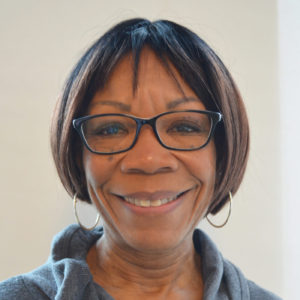
Zelda Foxall held a 38-year career focused on civil rights as a researcher, trainer, technical assistance coordinator, branch chief, and investigator for public accommodations, housing, and employment discrimination, working for the U.S. Department of Education, Office for Civil Rights, and the Washington State Human Rights Commission. Zelda currently volunteers for RESULTS, an anti-poverty organization, and AARP, where she advocates for Medicaid, economic security, housing, hunger, fraud, health care, and safety net programs that support older adults.
Advocacy Committee Chair: Diana Thompson 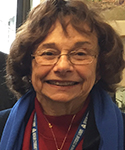
Diana Thompson serves on the Bellevue Network on Aging, which supports aging services in Bellevue through outreach, regional collaboration, and community involvement. She serves as legislative liaison for the Hearing Loss Association of America, Washington State Chapter. Diana also volunteers through AARP, advocating for the interests of older adults at the local, state, and federal level. She has written numerous articles and opinion editorials about aging issues for local newspapers.
2024 Council Members
Joe Hailey 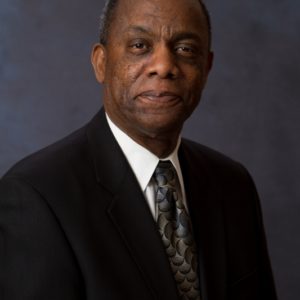
Joe Hailey was most recently Director of Development for Congregations for the Homeless, a Bellevue, Washington-based non-profit focused on ending homelessness on King County’s east side. Prior to that assignment he served as Corporate Relations Officer for United Way of King County in Seattle, Washington.
Joe joined the nonprofit sector in 2011 after a decades-long career in the high tech sector during which he held positions of increasing responsibility with industry leaders such as IBM Corporation and Cisco Systems. He served as Director of Development for Evergreen Software Tools in Redmond, Washington, and held the same position at Sterling Software in San Bernardino, California. He was Senior Director, Product Development, at Solucient, LLC located in Bellevue Washington. As Senior Programmer-Manager, his last position at IBM, he was responsible for the day-to-day operations of a 55-person software engineering team with a multi-million dollar departmental budget. While still at IBM, Joe also found time to co-own and operate a gourmet cookware store in Gilroy, California, and in later years owned and operated a full-service insurance and financial services agency located in Kirkland, Washington.
Joe holds a BA in Applied Mathematics with departmental honors from the University of Laverne, located in Laverne, California; an MS in Applied Mathematics from Santa Clara University, located in Santa Clara, California; and is a graduate of United Way’s highly-coveted Project Lead program, an initiative designed to prepare people of color for non-profit board service and other positions of leadership within the community.
Cynthia Snyder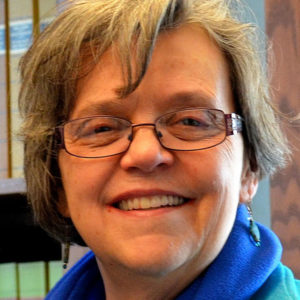
Cynthia Snyder’s early career focused on children where she worked for 30 years with children and adults with disabilities for the State of Pennsylvania. Then served Penncrest School District as a Board Member for 17 years. In addition, she participated in the Head Start Advisory Board and the Child Death Review Board. Later she turned her attention to senior issues. She is currently an active member of the Mount Si Senior Center board in North Bend, WA and she is comfortable advocating with legislators and local politicians on human service related issues.
Hon. Marli Larimer (Kent) 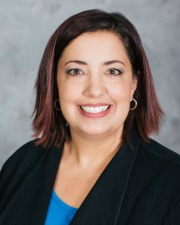
Kent City Councilmember Marli Larimer is the newest addition to the Advisory Council. Born and raised in Portland, Marli’s family lived in Arizona and California during her teens, before settling in Kent when she was a junior in high school. Marli graduated from Kentwood in 1992, left for college, and lived in Seattle where she met her husband Terry.
Wanting to move to the suburbs to raise their family, the couple returned to Kent 10 years ago. They have two children in Kent schools, who are active in soccer, tennis, ballet and scouts. Like many Kent residents, Marli balances work, family and community life. With a bachelor’s degree in mass communications and an associate’s degree in non-profit management, Marli works for Amazon, providing marketing support and guidance to small- and medium-sized businesses to help them be successful.
When not at work, Marli is an active community volunteer, working with Evergreen City Ballet, Girl Scouts of Western Washington, her kids’ schools and the school district. She was recently appointed to serve on the Seattle-King County Advisory Council for Aging & Disability Services. Every year, Marli and Terry take their kids, who are avid Harry Potter fans, to Emerald City Comic Con. The family also enjoys camping, gaming, board games, and exploring Kent parks and green spaces.
Tom Minty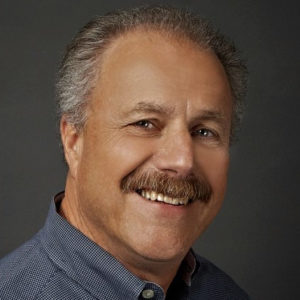
Tom Minty is actively involved in activities that promote an awareness of the unique housing needs of people with disabilities and our aging population. According to Tom, a friend of his with multiple sclerosis raised his awareness of the obstacles people with disabilities face. As a realtor, he recognized there was a lack of awareness in his field of the challenges people with physical limitations confront. He sought specialized training to understand the housing needs and choices available to people with disabilities and people who wish to age in place. He gained the designation as a Seniors Real Estate Specialist through the National Association of Realtors. Tom promotes a broader awareness of these needs by speaking at professional conferences and other events including the Master Builders Association, the Seattle Home Show and local real-estate association events. He has been an active participant in the Northwest Universal Design Council. Most recently he served on the NWUDC Housing Task Force to create a document targeted to builders and remodelers which defines specific residential universal design features. Tom is committed to educating builders as well as consumers about forward-thinking, sustainable home design and construction.
Hon. Cathy Moore (Seattle)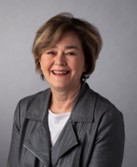
Cathy Moore grew up in Seattle, in the Lake City and Capitol Hill neighborhoods.
Following in her mother’s public service footsteps, Cathy fought for Seattle residents as a public defender with the Seattle Defender Association immediately after law school, later fighting for children and families as a family law attorney. As Chair of the Seattle Human Rights Commission, Cathy advocated for constitutional policing and accountability for the Seattle Police Department, before acting as Interim City Clerk, overseeing the legislative department of the Seattle City Council.
Cathy was elected a King County Superior Court Judge in 2016. In addition to ruling in criminal, family law, and civil commitment trials, Cathy upheld Attorney General Ferguson’s lawsuit against Pharma Purdue, a case that eventually resulted in a landmark settlement to fund opioid treatment. In her commitment to racial justice, Cathy also worked on criminal legal system reform.
Throughout the years Cathy and her husband raised a family – her three sons all attending Seattle Public Schools. Cathy’s mission is to create a city where all Seattleites can have the privileges and good fortune that she and her family have enjoyed.
Hon. Kim-Khánh Văn (Renton)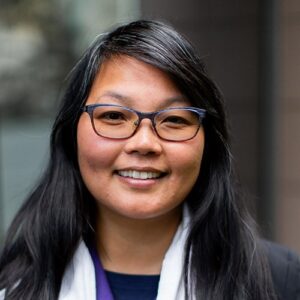
Councilmember Kim-Khánh Văn is a lifelong optimist and believer in people. She learned at an early age that by working hard, being humble and thrifty, and trying to make a difference, you can affect someone else’s life. She is willing to dig in and be a part of the solution.
Kim-Khánh was born in Vietnam, raised by a mother who took her four children and left a dangerous country when Kim-Khánh was six years old and fled to a refugee camp in the Philippines. Eventually her family received sponsorship from a wonderful church, and civic and charitable organizations in the Seattle area. When she was able, she took advantage of leadership and tutoring programs made possible by non-profit organizations and worked throughout high school and college.
As the primary translator for her family, Councilmember Văn learned how the human services system was designed to help families and this led to her interest in law. After attending the University of Washington, she became the first in her family to graduate from a four-year-university. She then attended and graduated from the University of Dayton, School of Law. Her upbringing, combined with the kindness and generosity of charitable organizations has developed in her a passion for justice and “paying-it-forward”.
Since moving to Renton with her husband and their two children, Kim-Khánh has been an active member of the Mayor’s Inclusion Task Force, Renton Rotary, Northwest Immigrant’s Rights Project, Seattle Stand Down veteran’s group, Asian Pacific Islander Americans for Civic Empowerment, Washington State Association for Justice and the American Immigration Lawyers Association among others.
Councilmember Văn’s priorities include working hard to keep Renton’s neighborhoods safe for all, efforts to lessen the burden for small businesses, as she sees them as the driving force of our local economy, and she would like to ensure that city policies and ordinances reflect Renton’s diverse population.
She states, “We are ‘Becoming Renton’ but we are not done. Even though you may see prosperity around you, all of us have a civic duty to bring out the best in our neighbors to continue to make Renton a great place to live, work, play and learn.”
Dick Woo
Dick Woo brings an important financial component and human services perspective to the Aging and Disability Services Advisory Council. He currently serves as Board Chair at Salal Credit Union, as well as on the boards of Interim Community Development Association and the International District Parking Association. Dick is a licensed Certified Public Accountant (CPA), Chartered Global Management Accountant (CGMA), and a former Certified Government Financial Manager (CGFM).
Dick has over thirty years of financial management experience in the public and private sectors, including positions with the U.S. Government Accountability Office (GAO), a City of Seattle chartered preservation and development authority, and a large savings institution. As a Congressional auditor, Dick has evaluated programs administered through the Federal Administration on Aging as well as projects implemented through not-for-profit agencies.
Dick recently retired as Director of Finance and Operations at YouthCare, a Seattle-based not-for-profit organization serving homeless youths, and previously served as CFO for King County’s Community Services Division, and as Director of Finance and Administrative Services for the City of Seattle Housing Authority.
Advocacy Committee
Advocates for the health and welfare needs of older persons and adults with disabilities and monitors legislation and policy measures on their behalf.
Chair: Diana Thompson
Meeting time: 2nd Friday, 10:00–11:30 a.m.
Planning and Allocations Committee
Studies in detail programs and projects receiving funding from Aging and Disability Services and makes recommendations regarding their support.
Chair: Lorna Stone
Meeting time: 1st Monday, 10:00 a.m.–12:00 p.m.
Executive Committee
Comprises Advisory Council Chair and other officers, standing committee chairs, and task force chairs.
Chair: Alex O’Reilly
Meeting time: As needed
Members: Officers and Committee Chairs
Nominating Committee
Elected by majority vote, the Committee is composed of three members (one from each sponsoring body). This Committee presents a slate of officers at a regular Council meeting two months prior to the Annual meeting.
Members: To be determined
Meeting time: As needed
Northwest Universal Design Council Committee
Advocates for the inclusion of Universal Design principles, products, and processes that enable everyone, regardless of age or ability to age in place. For more information, visit the NWUDC website or the Facebook page.
Liaison: Tom Minty
Members: Universal Design Advocates from the community
Meeting time: Quarterly Programs
State Council on Aging Committee
The Washington State Council on Aging serves as the State Unit on Aging with respect to federally funded programs as required by federal regulation. The Council advises the Governor and DSHS secretary on policies, programs, and services affecting older adults, promotes opportunities and challenges faced by older adults, and promotes self-advocacy through workshops, conferences, and other trainings.
King County representative: N/A
For information about any Advisory Council Committee, meetings, or activities, e-mail aginginfo@seattle.gov or use the Contact form.
The Advisory Council meets monthly on the 2nd Friday from 12:00 noon to 2:00 p.m. All meetings are open to the public.
If you would like to be notified of monthly meeting agendas and announcements, email Michael.Adusah@seattle.gov.
To confirm specific meeting times and locations, e-mail aginginfo@seattle.gov.
2024 Meetings
April 12, 2024
March 8, 2024
- Council Minutes: COMING SOON
- Committee Minutes: COMING SOON
- Presentation: Hoarding Catherine Farr, Director of Housing Stabilization and Supports at Full Life Care
February 9, 2024
- Council Minutes: 02/09/24 Advisory Council Minutes
- Committee Minutes: 02/09/24 Advocacy Committee Minutes (REVISED March 18, 2024)
- Presentation: Community Living Connections Investment Process Allison Boll
January 12, 2024
- Minutes: 01/12/24 Advocacy Committee and Advisory Council Meeting Minutes
- Presentation: On Artificial Intelligence Dr. Clara Berridge, School of Social Work University of Washington
- Handout: 2024 Bill Tracker (Current as of January 12, 2024)
Past Meeting Minutes and Materials are Available Here.
Join us in Promoting an Age-Friendly Community
The Advisory Council is currently seeking new members who are interested in issues and services affecting older people and adults with disabilities.
Advisory Council members have opportunities to hear and discuss cutting-edge information about issues facing older adults in our community, meet with legislators, and make a difference by advocating for age-friendly communities.
Each Advisory Council member is sponsored by the City of Seattle or King County. The terms are two years with a limit of three terms for King County and the City of Seattle.
Prospective members can expect a time commitment of four to six hours per month, which includes one monthly meeting (2nd Friday of each month), committee work, training and travel time. Upon appointment, Advisory Council members will be provided with a virtual orientation manual to help them understand their roles, responsibilities, and available resources.
Interested in Joining the Advisory Council?
- Complete and submit an application.
Other Ways to Get Involved
The Advisory Council welcomes anyone who is interested in the work of the Council to attend their monthly meetings. You do not need to be a member to attend and contribute. Other ways to get involved include:
- Participate in special events hosted or co-sponsored by the Advisory Council or one of our community partners.
- Join the Washington State Senior Lobby.
- Get involved with one of our community partners:
- AARP Washington
- Age Friendly Coalition for Seattle & King County
- Alzheimer’s Association
- Bellevue Network on Aging
- Community Living Connections (network providers)
- Housing Development Consortium
- King County Alliance for Human Services
- Kirkland Senior Council
- Northwest Universal Design Council
- Puget Sound Advocates for Retirement Action (PSARA)
- Seattle Commission for People with disAbilities
- Seattle Human Services Coalition
- Washington Low Income Housing Alliance
- Washington State Council on Aging
Note: The above is a parcel list of our partners.
For free, confidential access to aging network services in Seattle-King County, contact Community Living Connections.
![Aging & Disability Services for Seattle & King County [logo]](https://www.agingkingcounty.org/wp-content/themes/sads/images/seattle-ads-logo.png)
